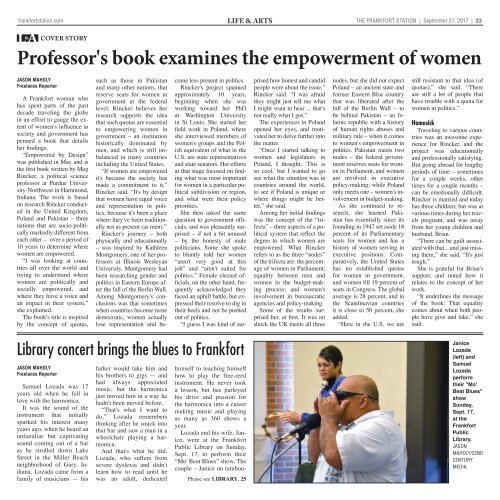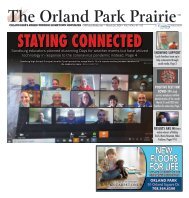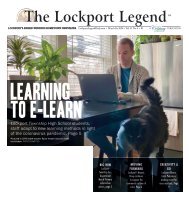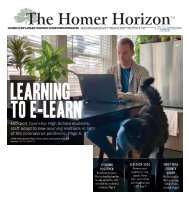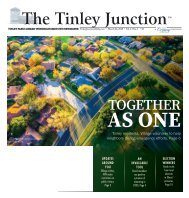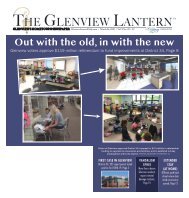FS_092117
The Frankfort Station 092117
The Frankfort Station 092117
You also want an ePaper? Increase the reach of your titles
YUMPU automatically turns print PDFs into web optimized ePapers that Google loves.
frankfortstation.com life & arts<br />
the frankfort station | September 21, 2017 | 23<br />
Professor's book examines the empowerment of women<br />
Jason Maholy<br />
Freelance Reporter<br />
A Frankfort woman who<br />
has spent parts of the past<br />
decade traveling the globe<br />
in an effort to gauge the extent<br />
of women's influence in<br />
society and government has<br />
penned a book that details<br />
her findings.<br />
“Empowered by Design”<br />
was published in May and is<br />
the first book written by Meg<br />
Rincker, a political science<br />
professor at Purdue University-Northwest<br />
in Hammond,<br />
Indiana. The work is based<br />
on research Rincker conducted<br />
in the United Kingdom,<br />
Poland and Pakistan – three<br />
nations that are socio-politically<br />
markedly different from<br />
each other – over a period of<br />
10 years to determine where<br />
women are empowered.<br />
“I was looking at countries<br />
all over the world and<br />
trying to understand where<br />
women are politically and<br />
socially empowered, and<br />
where they have a voice and<br />
an impact in their system,”<br />
she explained.<br />
The book's title is inspired<br />
by the concept of quotas,<br />
such as those in Pakistan<br />
and many other nations, that<br />
reserve seats for women in<br />
government at the federal<br />
level. Rincker believes her<br />
research supports the idea<br />
that such quotas are essential<br />
to empowering women in<br />
government – an institution<br />
historically dominated by<br />
men, and which is still imbalanced<br />
in many countries<br />
including the United States.<br />
“If women are empowered<br />
it's because the society has<br />
made a commitment to it,”<br />
Rincker said. “It's by design<br />
that women have equal voice<br />
and representation in politics,<br />
because it's been a place<br />
where they've been traditionally<br />
not as present (as men).”<br />
Rincker's journey – both<br />
physically and educationally<br />
– was inspired by Kathleen<br />
Montgomery, one of her professors<br />
at Illinois Wesleyan<br />
University. Montgomery had<br />
been researching gender and<br />
politics in Eastern Europe after<br />
the fall of the Berlin Wall.<br />
Among Montgomery's conclusions<br />
was that sometimes<br />
when countries become more<br />
democratic, women actually<br />
lose representation and become<br />
less present in politics.<br />
Rincker's project spanned<br />
approximately 10 years,<br />
beginning when she was<br />
working toward her PhD<br />
at Washington University<br />
in St Louis. She started her<br />
field work in Poland, where<br />
she interviewed members of<br />
women's groups and the Polish<br />
equivalent of what in the<br />
U.S. are state representatives<br />
and state senators. Her efforts<br />
at that stage focused on finding<br />
what was most important<br />
for women in a particular political<br />
subdivision or region,<br />
and what were their policy<br />
priorities.<br />
She then asked the same<br />
question to government officials,<br />
and was pleasantly surprised<br />
– if not a bit amused<br />
– by the honesty of male<br />
politicians. Some she spoke<br />
to bluntly told her women<br />
“aren't very good at this<br />
job” and “aren't suited for<br />
politics.” Female elected officials,<br />
on the other hand, frequently<br />
acknowledged they<br />
faced an uphill battle, but expressed<br />
their resolve to dig in<br />
their heels and not be pushed<br />
out of politics.<br />
“I guess I was kind of surprised<br />
how honest and candid<br />
people were about the issue,”<br />
Rincker said. “I was afraid<br />
they might just tell me what<br />
I might want to hear ... that's<br />
not really what I got.”<br />
The experiences in Poland<br />
opened her eyes, and motivated<br />
her to delve further into<br />
the matter.<br />
“Once I started talking to<br />
women and legislators in<br />
Poland, I thought, 'This is<br />
so cool,' but I wanted to go<br />
see what the situation was in<br />
countries around the world,<br />
to see if Poland is unique or<br />
where things might be better,”<br />
she said.<br />
Among her initial findings<br />
was the concept of the “trifecta”<br />
– three aspects of a political<br />
system that reflect the<br />
degree to which women are<br />
empowered. What Rincker<br />
refers to as the three “nodes”<br />
of the trifecta are: the percentage<br />
of women in Parliament;<br />
equality between men and<br />
women in the budget-making<br />
process; and women's<br />
involvement in bureaucratic<br />
agencies and policy-making.<br />
Some of the results surprised<br />
her, at first. It was no<br />
shock the UK meets all three<br />
nodes, but she did not expect<br />
Poland – an ancient state and<br />
former Eastern Bloc country<br />
that was liberated after the<br />
fall of the Berlin Wall – to<br />
be behind Pakistan – an Islamic<br />
republic with a history<br />
of human rights abuses and<br />
military rule – when it comes<br />
to women's empowerment in<br />
politics. Pakistan meets two<br />
nodes – the federal government<br />
reserves seats for women<br />
in Parliament, and women<br />
are involved in executive<br />
policy-making; while Poland<br />
only meets one – women's involvement<br />
in budget-making.<br />
As she continued to research,<br />
she learned Pakistan<br />
has essentially since its<br />
founding in 1947 set aside 18<br />
percent of its Parliamentary<br />
seats for women and has a<br />
history of women serving in<br />
executive positions. Comparatively,<br />
the United States<br />
has no established quotas<br />
for women in government,<br />
and women fill 19 percent of<br />
seats in Congress. The global<br />
average is 28 percent, and in<br />
the Scandinavian countries<br />
it is close to 50 percent, she<br />
added.<br />
“Here in the U.S. we are<br />
still resistant to that idea (of<br />
quotas),” she said. “There<br />
are still a lot of people that<br />
have trouble with a quota for<br />
women in politics.”<br />
Homesick<br />
Traveling to various countries<br />
was an awesome experience<br />
for Rincker, and the<br />
project was educationally<br />
and professionally satisfying.<br />
But going abroad for lengthy<br />
periods of time – sometimes<br />
for a couple weeks, other<br />
times for a couple months –<br />
can be emotionally difficult.<br />
Rincker is married and today<br />
has three children; but was at<br />
various times during her travels<br />
pregnant, and was away<br />
from her young children and<br />
husband, Brian.<br />
“There can be guilt associated<br />
with that... and just missing<br />
them,” she said. “It's just<br />
tough.”<br />
She is grateful for Brian's<br />
support, and noted how it<br />
relates to the concept of her<br />
work.<br />
“It underlines the message<br />
of the book: That equality<br />
comes about when both people<br />
have give and take,” she<br />
said.<br />
Library concert brings the blues to Frankfort<br />
Jason Maholy<br />
Freelance Reporter<br />
Samuel Lozada was 17<br />
years old when he fell in<br />
love with the harmonica.<br />
It was the sound of the<br />
instrument that initially<br />
sparked his interest many<br />
years ago, when he heard an<br />
unfamiliar but captivating<br />
sound coming out of a bar<br />
as he strolled down Lake<br />
Street in the Miller Beach<br />
neighborhood of Gary, Indiana.<br />
Lozada came from a<br />
family of musicians — his<br />
father would take him and<br />
his brothers to gigs — and<br />
had always appreciated<br />
music, but the harmonica<br />
just moved him in a way he<br />
hadn't been moved before.<br />
“That's what I want to<br />
do,” Lozada remembers<br />
thinking after he snuck into<br />
that bar and saw a man in a<br />
wheelchair playing a harmonica.<br />
And that's what he did.<br />
Lozada, who suffers from<br />
severe dyslexia and didn't<br />
learn how to read until he<br />
was an adult, dedicated<br />
himself to teaching himself<br />
how to play the free-reed<br />
instrument. He never took<br />
a lesson, but has parleyed<br />
his drive and passion for<br />
the harmonica into a career<br />
making music and playing<br />
as many as 360 shows a<br />
year.<br />
Lozada and his wife, Janice,<br />
were at the Frankfort<br />
Public Library on Sunday,<br />
Sept. 17, to perform their<br />
“Mo' Beat Blues” show. The<br />
couple – Janice on tambou-<br />
Please see library, 25<br />
Janice<br />
Lozada<br />
(left) and<br />
Samuel<br />
Lozada<br />
perform<br />
their "Mo'<br />
Beat Blues"<br />
show<br />
Sunday,<br />
Sept. 17,<br />
at the<br />
Frankfort<br />
Public<br />
Library.<br />
Jason<br />
Maholy/22nd<br />
Century<br />
Media


